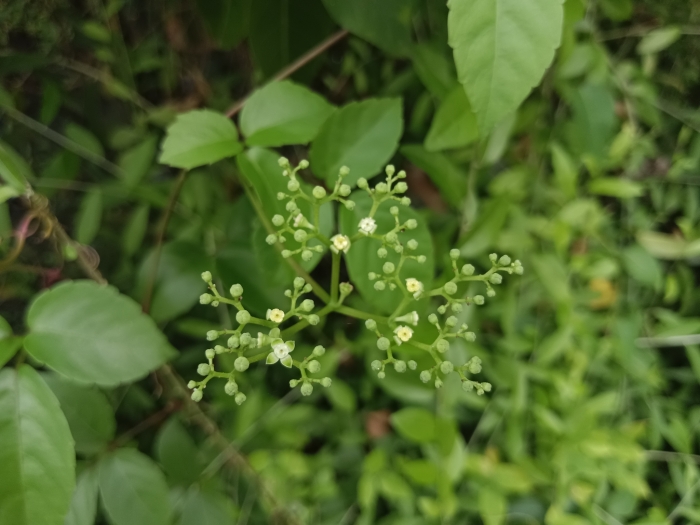Bush Grape
(Causonis trifolia)
Bush Grape (Causonis trifolia)
/
/

© renjus box
CC BY 4.0
Image By:
© renjus box
Recorded By:
Copyright:
CC BY 4.0
Copyright Notice:
Photo by: © renjus box | License Type: CC BY 4.0 | License URL: http://creativecommons.org/licenses/by/4.0/ | Uploader: renju | Publisher: iNaturalist |

























Estimated Native Range
Summary
Causonis trifolia, commonly known as bush grape, fox-grape, three-leaved wild vine, or threeleaf cayratia, is a deciduous liana native to a variety of habitats including monsoon forests, woodland areas, and thickets across Australia and Asia, including the Indian subcontinent and the Philippines. It typically climbs to heights of 10-15 meters using tendrils. This vine is characterized by its trifoliate leaves and small, inconspicuous greenish-white flowers that bloom in clusters. The flowers are followed by small, black berries that are attractive to wildlife but are not particularly showy for ornamental purposes. The presence of flavonoids like cyanidin and delphinidin in the berries suggests potential antioxidant benefits.
Bush grape is valued for its vigorous growth and adaptability to a range of soil types, from well-drained sandy soils to heavier clay loams. It thrives in full sun to part shade and requires moderate watering, making it relatively low maintenance. In cultivation, it is often used for covering fences, trellises, or as a ground cover in tropical and subtropical gardens. However, gardeners should be cautious as hydrocyanic acid present in the stem, leaves, and roots can be toxic if ingested. There are no popular garden cultivars of this species, and it is not commonly found in the horticultural trade.CC BY-SA 4.0
Bush grape is valued for its vigorous growth and adaptability to a range of soil types, from well-drained sandy soils to heavier clay loams. It thrives in full sun to part shade and requires moderate watering, making it relatively low maintenance. In cultivation, it is often used for covering fences, trellises, or as a ground cover in tropical and subtropical gardens. However, gardeners should be cautious as hydrocyanic acid present in the stem, leaves, and roots can be toxic if ingested. There are no popular garden cultivars of this species, and it is not commonly found in the horticultural trade.CC BY-SA 4.0
Plant Description
- Plant Type: Vine
- Height: 6-10 feet
- Width: 4-8 feet
- Growth Rate: Moderate
- Flower Color: White
- Flowering Season: Summer
- Leaf Retention: Deciduous
Growth Requirements
- Sun: Full Sun, Part Shade
- Water: Medium
- Drainage: Medium, Fast
Common Uses
Drought Tolerant, Low Maintenance
Natural Habitat
Native to monsoon forests, woodland areas, and thickets across Australia and Asia, including the Indian subcontinent and the Philippines
Other Names
Common Names:
Scientific Names: , Causonis trifolia, Causonis trifolia, Cayratia carnosa, Cayratia carnosa, Cayratia timorensis, Cayratia trifolia, Cayratia trifolia var. cinerea, Cayratia trifolia var. cinerea, Cayratia trifolia var. cinerea
GBIF Accepted Name: